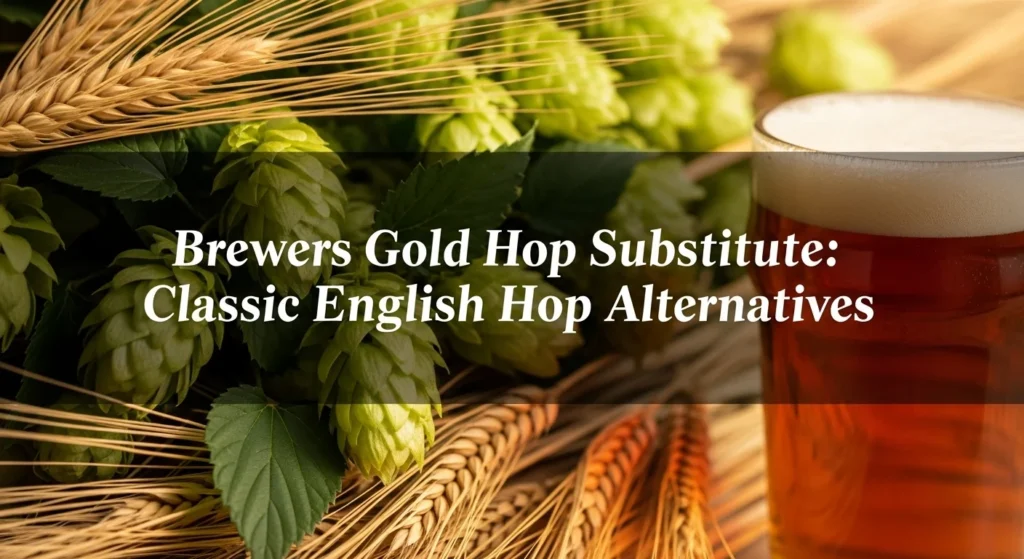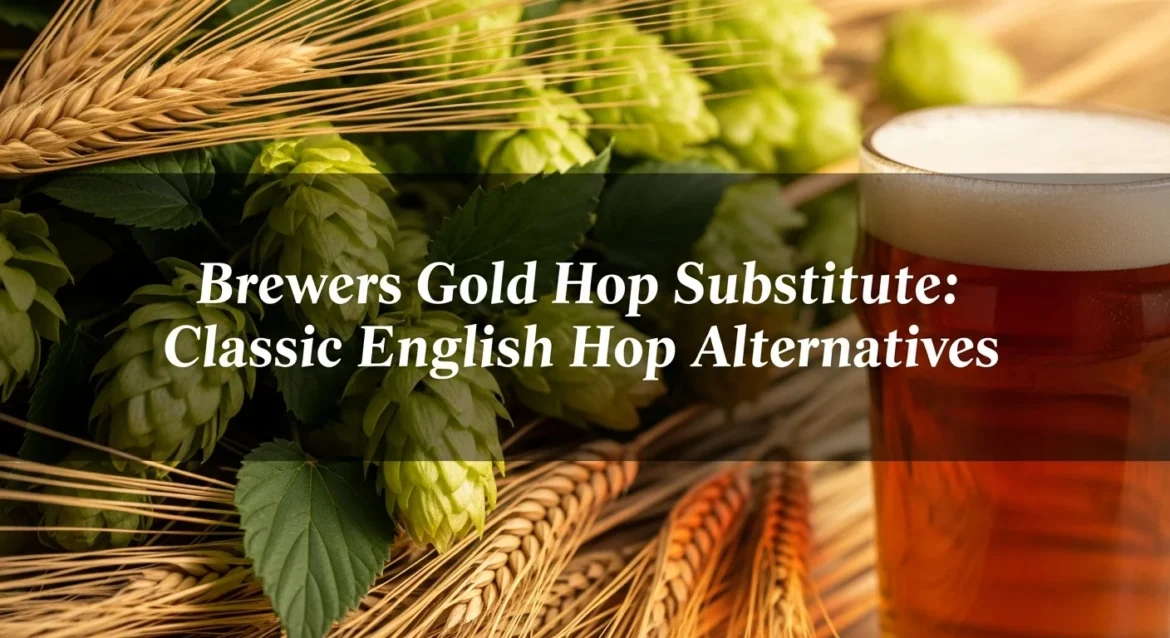Looking for the perfect Brewers Gold hop substitute? Discover classic English alternatives like Bullion, Northern Brewer, and Galena that deliver similar blackcurrant flavors and clean bitterness for your homebrew.

Picture this: You’ve got your grain bill measured, your water chemistry dialed in, and your recipe ready to roll. Then you check your hop stash and realize you’re out of Brewers Gold. I’ve been there more times than I care to admit during my decade of homebrewing.
Here’s the good news. Finding a solid Brewers Gold hop substitute doesn’t have to derail your brew day. This classic English variety has several close relatives that can step in without compromising your beer’s character. Throughout this guide, I’ll share the hop alternatives I’ve tested extensively in my own brewing setup, along with the science behind why they work.
Whether you’re crafting a robust porter, a traditional English bitter, or experimenting with darker ales, understanding hop substitution will make you a more versatile brewer. Let’s explore the best alternatives to keep your brewing schedule on track.
Understanding Brewers Gold: The Grandfather of Modern Hops
Before we jump into substitutes, you need to understand what makes Brewers Gold special. This variety was developed in 1919 at Wye College in England by Professor Ernest Stanley Salmon. It came from the open pollination of a wild hop sourced from Manitoba, Canada.What struck me when I first brewed with Brewers Gold was its distinctive blackcurrant character. The hop delivers alpha acids ranging from 5-9%, depending on where it’s grown. American-grown versions typically hit the higher end of that range, while European varieties tend to be slightly milder.
The flavor profile features prominent notes of blackcurrant, spice, and earthy undertones. When used early in the boil, Brewers Gold provides clean, assertive bitterness. Added later, it brings forward those characteristic dark fruit flavors that work beautifully with darker malts.
Here’s something fascinating: Brewers Gold is the grandfather of many hops you probably use regularly. It’s an ancestor to Galena, Nugget, Centennial, and even Cascade. Despite its impressive lineage, the variety fell out of commercial favor when super-alpha hops emerged in the 1980s. That doesn’t mean it lacks value for homebrewers, though.Why You Might Need a Brewers Gold Replacement
Brewers Gold isn’t the easiest hop to find these days. Most commercial breweries shifted to newer varieties with higher alpha acids and better disease resistance. Your local homebrew shop might not stock it regularly.
I’ve also noticed significant variation between harvest years. Alpha acid content can swing dramatically based on growing conditions. This inconsistency can make recipe formulation tricky if you’re aiming for precise IBU targets.
Another consideration is cost. When available, Brewers Gold often commands premium pricing compared to more common varieties. If you’re brewing large batches or experimenting with recipes, that expense adds up quickly.
Sometimes you just want to explore different flavor profiles. I’ve discovered some of my favorite beers by swapping hops and seeing what happens. Understanding substitutions gives you creative freedom while maintaining the core character of your recipe.
Top Brewers Gold Hop Substitutes for Homebrewing
Bullion: The Sister Hop
Bullion is nearly identical to Brewers Gold. They’re sister selections from the same breeding program, and honestly, most brewers can’t tell them apart in a finished beer.
I use Bullion interchangeably with Brewers Gold in almost every recipe. The hop features similar alpha acids (6.5-9%) and that same bold blackcurrant character. When I brewed a side-by-side comparison in an ESB, even experienced tasters struggled to identify differences.
Best for: English ales, stouts, porters, and any recipe calling for Brewers Gold
Substitution ratio: 1:1 direct replacement
The main advantage of Bullion is slightly better availability. While still not ubiquitous, you’ll have better luck finding it than Brewers Gold. The flavor characteristics match so closely that your beer won’t suffer from the swap.
Northern Brewer: The Versatile Alternative
Northern Brewer represents one of my go-to substitutions when Brewers Gold isn’t available. This German cross between Canterbury Golding and a Brewers Gold seedling delivers woody, minty, and slightly peppery notes.
The alpha acid range (8-10%) runs slightly higher than Brewers Gold. I typically reduce the amount by about 10-15% to hit the same IBU targets. The flavor differs somewhat – you’ll get more evergreen and wood notes rather than pure blackcurrant – but it complements similar beer styles beautifully.
I’ve used Northern Brewer successfully in California Common, English pale ales, and robust porters. The hop works particularly well in maltier beers where its woody character adds complexity without overwhelming the grain bill.Best for: California Common, ESB, porter, German lagers
Substitution ratio: Use 85-90% of the Brewers Gold amount
One thing I appreciate about Northern Brewer is its dual-purpose nature. You can use it for bittering, flavor, and aroma additions throughout the brewing process. This versatility makes recipe adjustments easier when you’re working with what you have on hand.
Galena: The Clean Bittering Option
Galena is a direct descendant of Brewers Gold, inheriting its parent’s bittering prowess while developing a slightly different aroma profile. With alpha acids typically between 12-14%, Galena packs more punch than its ancestor.
When substituting Galena for Brewers Gold, I cut the amount roughly in half to maintain similar bitterness levels. The flavor leans more toward citrus and earthy notes rather than blackcurrant, but it provides that same clean, sharp bitterness that makes Brewers Gold valuable.
I particularly like Galena in higher-gravity beers where you need substantial bitterness without adding excessive hop material. It’s been my secret weapon in barley wines and imperial stouts when Brewers Gold wasn’t available.Best for: Imperial stouts, barley wines, IPAs, strong ales
Substitution ratio: Use 40-50% of the Brewers Gold amount (adjust based on actual alpha acids)
The main consideration with Galena is its higher cohumulone content (roughly 35-40%). This can produce a slightly harsher bitterness compared to Brewers Gold’s smoother profile. I compensate by adding it slightly later in the boil when using it as a substitute.
Cascade: The American Twist
Here’s an interesting one. While Cascade might seem like an odd choice, it’s actually a distant relative of Brewers Gold and can work in certain applications.
Cascade brings prominent citrus and grapefruit notes rather than blackcurrant. The alpha acids (4.5-7%) sit in a similar range to European Brewers Gold, making the math easier. I’ve successfully used Cascade as a Brewers Gold replacement in American-style pale ales where the flavor shift actually enhanced the final beer.Best for: American pale ales, amber ales, lighter porters
Substitution ratio: 1:1 for alpha acids; expect different flavor profile
The key is understanding that this substitution changes your beer’s character. You’re moving from an English hop profile toward something more distinctly American. I only recommend this swap when you’re open to experimentation or specifically want to add citrus notes to your recipe.
Northdown: The English Alternative
Northdown was bred specifically to overcome disease problems in Northern Brewer while maintaining similar brewing characteristics. It shares genetic ties to the Brewers Gold family and delivers comparable performance.
The hop provides alpha acids around 7.5-9.5% with earthy, woody, and slightly fruity notes. I’ve found it works exceptionally well in traditional English bitters and ESBs where you want that classic British hop character.
Best for: English bitter, ESB, mild, brown ale
Substitution ratio: Use 90-95% of the Brewers Gold amount
Northdown availability can be spotty in the United States, but it’s worth seeking out if you regularly brew English styles. The flavor stays closer to Brewers Gold than Northern Brewer while offering better disease resistance and storage stability.
Hop Pairing Strategies with Brewers Gold Substitutes
Understanding individual hop substitutes is one thing. Knowing how to combine them takes your brewing to another level.
I’ve discovered that blending substitutes often produces better results than relying on a single hop. For example, combining Northern Brewer for bittering with a touch of Cascade for aroma can approximate Brewers Gold’s dual-purpose nature while adding complexity.
Classic English Pairing:
- Northern Brewer (bittering)
- East Kent Goldings (flavor and aroma)
- This combination mimics traditional English hop character while providing the clean bitterness Brewers Gold offers
American Adaptation:
- Galena (bittering)
- Cascade (flavor and aroma)
- Creates a cleaner, brighter profile with similar bitterness levels
Traditional Approach:
- Bullion (bittering and flavor)
- Fuggle (late addition for aroma)
- Stays closest to authentic Brewers Gold character
When working with hop blends, I start by replacing the bittering portion with the substitute that matches alpha acid levels most closely. Then I adjust flavor and aroma hops based on the specific beer style and desired outcome.
Remember that hop freshness matters as much as variety. A fresh substitute will always outperform stale Brewers Gold. Store your hops properly in airtight containers in the freezer, and they’ll maintain quality for months.Adjusting Your Recipe for Hop Substitutions
Let’s talk numbers. Simply swapping hops by weight rarely works well. You need to calculate based on alpha acid content to maintain consistent bitterness.
Here’s the formula I use: New hop weight = (Old hop weight × Old hop AA%) / New hop AA%
For example, if your recipe calls for 1 ounce of Brewers Gold at 7% AA, and you’re substituting with Galena at 13% AA: New weight = (1 oz × 7%) / 13% = 0.54 oz of Galena
Most brewing software handles these calculations automatically, but understanding the math helps when you’re adapting recipes on the fly.
Beyond bitterness, consider timing adjustments. Higher alpha hops added early can produce harsher bitterness. I often shift high-alpha substitutes to slightly later in the boil – say 50 minutes instead of 60 – to smooth out the bitterness profile.
For aroma and flavor additions, focus on the essential oil composition rather than just alpha acids. Myrcene content drives citrus and pine notes, while humulene contributes earthy, herbal character. Reviewing oil profiles helps predict how a substitute will perform in late additions and dry hopping.Beer Styles That Work Best with These Substitutes
Different substitutes shine in different beer styles. Here’s what I’ve learned through extensive testing:
English Bitter and ESB Northern Brewer or Northdown work beautifully here. The woody, earthy character complements English malt without overpowering the subtle hop profile these styles require.
Robust Porter and Stout Bullion is my first choice. The blackcurrant notes pair exceptionally well with roasted malts, creating that classic dark fruit character you find in traditional British porters.
California Common Northern Brewer is practically synonymous with this style. It delivers the sharp, clean bitterness and woody notes that define the category.
American Pale Ale Cascade brings a more modern twist while maintaining adequate bitterness. The citrus notes fit the style better than traditional Brewers Gold character.
Barley Wine and Imperial Stout Galena provides the high bitterness these big beers need without adding excessive hop material. The clean bitterness lets malt complexity shine through.
I’ve also experimented with these substitutes in Belgian dark ales, German lagers, and even the occasional saison. The key is understanding your beer’s flavor priorities and choosing the substitute that supports them.
Common Mistakes When Substituting Brewing Hops
After making plenty of substitution errors over the years, I can help you avoid the same pitfalls.
Mistake 1: Ignoring Cohumulone Levels High cohumulone hops can produce harsh, lingering bitterness. When Brewers Gold (30-35% cohumulone) gets replaced with a high-cohumulone variety, the beer’s bitterness quality changes noticeably. I’ve learned to reduce bittering additions by 10-15% when using high-cohumulone substitutes.
Mistake 2: Direct Weight-for-Weight Swaps This rookie error gets everyone at least once. Always calculate based on alpha acid percentages, not weight. A pound of 14% AA Galena provides nearly double the bitterness of a pound of 7% AA Brewers Gold.
Mistake 3: Overlooking Harvest Year Variation Alpha acids vary significantly between harvest years. That 2023 Northern Brewer sitting in your freezer might have different specs than the 2025 crop. Always check the actual analysis from your supplier rather than relying on typical ranges.
Mistake 4: Forgetting About Oil Composition Two hops with identical alpha acids can deliver vastly different flavors. Myrcene-heavy hops lean citrusy, while humulene-dominant varieties go earthy and spicy. Understanding oil profiles prevents unpleasant surprises.
Mistake 5: Not Accounting for Perceived Bitterness IBU calculations don’t tell the whole story. A malty English bitter and a dry IPA with identical IBUs taste completely different. Consider your beer’s overall balance when making substitutions.
Frequently Asked Questions
What is the closest substitute to Brewers Gold hops?
Bullion is the closest substitute to Brewers Gold hops. These sister selections from the same breeding program share nearly identical characteristics, including similar alpha acid ranges (6.5-9%), blackcurrant flavor profiles, and spicy undertones. Most brewers can use Bullion as a 1:1 direct replacement for Brewers Gold without any recipe adjustments.
Can I use Cascade instead of Brewers Gold?
Yes, you can use Cascade as a Brewers Gold substitute, but expect a different flavor profile. While both hops share genetic lineage and similar alpha acid ranges, Cascade delivers citrus and grapefruit notes rather than Brewers Gold’s characteristic blackcurrant and spice. This substitution works best in American-style pale ales where the flavor shift enhances rather than detracts from the intended beer style.
What alpha acid percentage should I use when substituting hops?
Calculate substitution amounts based on the actual alpha acid percentages of your specific hops, not generic ranges. Use this formula: New hop weight = (Old hop weight × Old hop AA%) / New hop AA%. For example, if substituting 1 ounce of 7% AA Brewers Gold with 13% AA Galena, you’d need 0.54 ounces of Galena to achieve equivalent bitterness.
Does Northern Brewer work in English-style beers?
Northern Brewer works excellently in English-style beers, particularly ESBs, bitters, and porters. Despite being a German variety, it was bred from Canterbury Golding and a Brewers Gold seedling, giving it appropriate characteristics for English styles. The hop provides woody, earthy notes that complement English malts well, though it delivers slightly different aromatics than pure Brewers Gold.
Why is Brewers Gold hard to find?
Brewers Gold became difficult to find after the 1980s when super-alpha hop varieties emerged. These newer hops offered higher alpha acid content, better disease resistance, and improved storage stability, making them more attractive to commercial growers. While Brewers Gold remains available from specialty suppliers and is still grown in Germany, most homebrew shops don’t stock it regularly due to limited commercial demand.
Can I blend different hops to replace Brewers Gold?
Blending hops often produces excellent results when replacing Brewers Gold. Try combining Northern Brewer for bittering with East Kent Goldings for aroma to approximate traditional English hop character. Another effective blend uses Galena for clean bitterness paired with Fuggle for late additions, creating similar complexity to what Brewers Gold provides in dual-purpose applications.
How does growing region affect Brewers Gold substitutes?
Growing region significantly impacts hop characteristics. American-grown Brewers Gold typically shows higher alpha acids (8-11%) compared to European versions (5-7%), while European hops often display more delicate fruit and spice notes. When selecting substitutes, consider where they were grown – American varieties tend toward bolder, more resinous character, while European hops lean softer and more traditional.
Should I adjust my water chemistry when changing hops?
Major hop substitutions don’t typically require water chemistry adjustments. However, if you’re moving from a low-alpha hop like Brewers Gold to a high-alpha substitute like Galena, consider your sulfate-to-chloride ratio. Higher bitterness levels sometimes benefit from increased sulfate to enhance hop character, though this depends more on beer style than the specific hop variety used.
Taking Your Hop Game to the Next Level
Understanding hop substitution opens up incredible brewing possibilities. You’re no longer locked into specific varieties or limited by availability at your local shop.
I encourage you to experiment with these substitutes in small batches first. Brew a simple pale ale or porter with different hop options and taste them side by side. You’ll quickly develop a sense for how each variety performs in your system with your water chemistry.
Keep detailed notes about your substitutions. Record not just the amounts and varieties used, but also your sensory impressions and what worked well. Over time, you’ll build personal substitution guidelines that work better than any generic chart.
Don’t be afraid to think outside the traditional substitution lists either. Some of my favorite beers came from unexpected hop combinations I tried when I ran out of my planned variety. The worst case scenario is you brew a beer that’s different from what you planned – and that’s how you learn and grow as a brewer.
Consider ordering multiple hop varieties when you place your next supply order. Having Northern Brewer, Cascade, Galena, and Fuggle on hand gives you flexibility for any recipe that calls for Brewers Gold or similar English varieties. Stored properly in your freezer, hops stay fresh for years.
Finally, remember that great beer is about balance and drinkability, not perfect adherence to a recipe. If you’re substituting hops thoughtfully based on alpha acids and flavor profiles, you’re going to make good beer. The perfect hop schedule matters less than proper fermentation temperature, good sanitation, and fresh ingredients.
Get out there and start brewing. Your next batch is waiting, and now you know exactly which hops to grab when Brewers Gold isn’t available.
About the Author
John Brewster is a passionate homebrewer with over a decade of experience experimenting with different beer styles and hop varieties. After working at three craft breweries and winning several regional homebrew competitions, John now dedicates his time to developing innovative recipes and teaching brewing techniques to fellow enthusiasts. His specialty lies in creating unique flavor profiles by combining traditional brewing methods with careful ingredient selection. When not tending to his five fermenters, John enjoys pairing his creations with artisanal cheeses and hosting tasting sessions for friends and family. Connect with him at [email protected] for more brewing insights.

